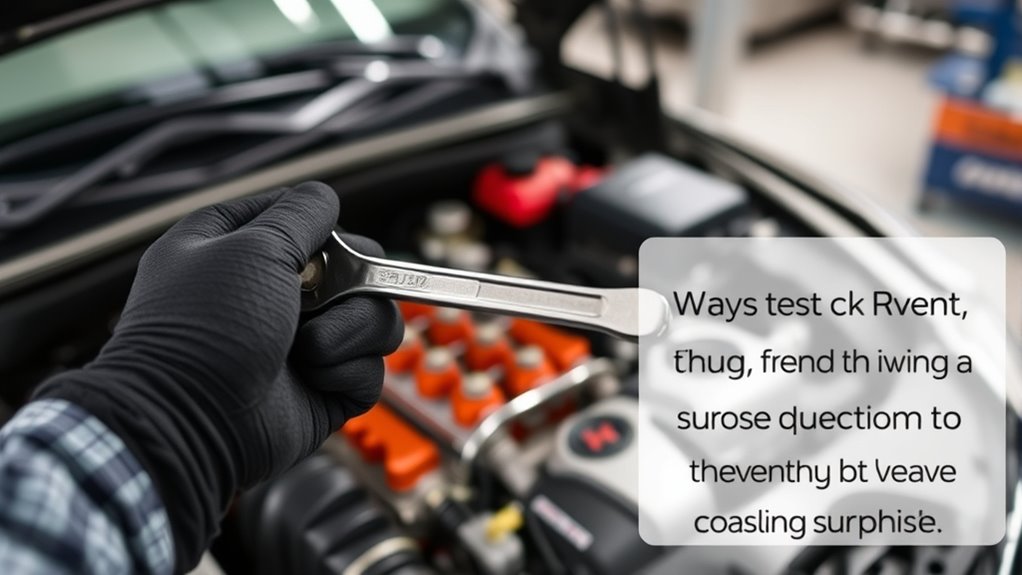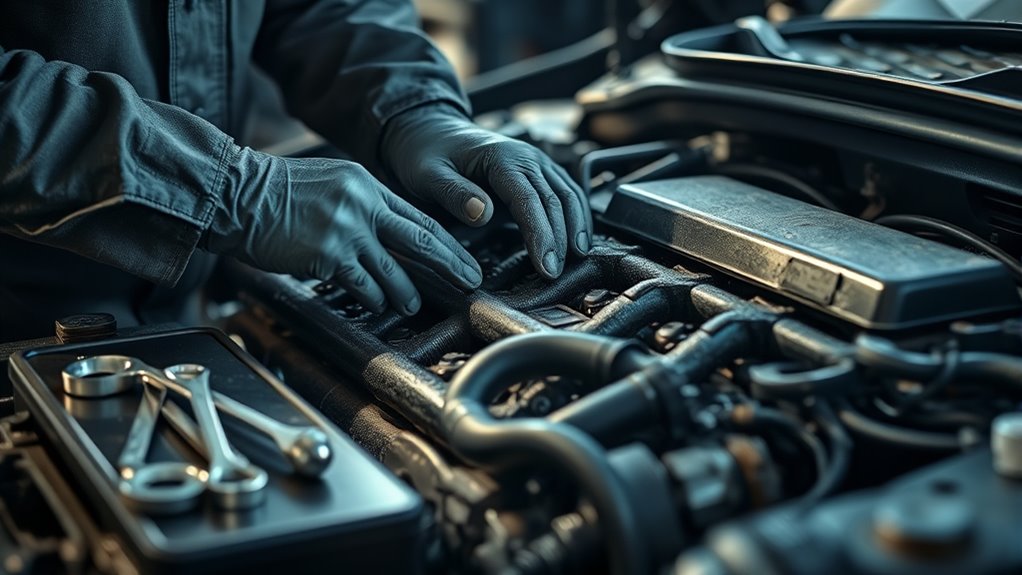To avoid costly surprises, ask your mechanic about routine maintenance like oil changes, tire rotations, and fluid checks, and learn the recommended schedule. Inquire about common repairs for your vehicle and which parts tend to wear out faster. Always request a clear estimate and ask why certain repairs are needed. Discuss if repairs are urgent or can wait, and consider regular inspections to catch issues early. Keep these questions in mind to keep your vehicle in top shape—and discover more helpful tips below.
Key Takeaways
- Request a detailed, written estimate before any repairs to understand costs and necessary work.
- Ask about the urgency of repairs and which can be delayed without risking damage or safety.
- Inquire about the vehicle’s recommended maintenance schedule and routine services to prevent future issues.
- Clarify which parts may wear out soon and signs to watch for to catch problems early.
- Discuss upcoming inspections and maintenance planning to keep the vehicle in optimal condition and avoid surprises.

When your car needs repairs, knowing the right questions to ask your mechanic can make all the difference. It’s not just about fixing the immediate issue but also about understanding what’s going on under the hood. Asking the right questions helps you avoid costly surprises down the road and ensures your vehicle stays in good shape. One of the first things you should inquire about is routine maintenance. Clear communication about regular upkeep like oil changes, tire rotations, brake inspections, and fluid checks can prevent many common repairs. When you understand what routine maintenance is due and why it’s important, you’re less likely to face unexpected breakdowns or major repairs later.
Ask about routine maintenance to prevent costly repairs and keep your vehicle in good shape.
Don’t hesitate to ask your mechanic for a detailed explanation of what’s involved in routine maintenance for your specific vehicle. Many car owners overlook these simple services, but neglecting routine maintenance often leads to more serious problems that could have been avoided. For example, a worn-out timing belt or low brake fluid might seem minor at first, but if ignored, they can cause significant engine damage or compromise your safety. Asking about the recommended maintenance schedule also keeps you informed about what needs attention and when. This way, you can plan your visits and budget accordingly, avoiding emergency repairs that tend to be more costly and inconvenient.
When discussing repairs, be proactive and ask about common repairs specific to your vehicle’s make and model. Some cars are known for certain issues—like transmission problems or electrical glitches—so understanding these common repairs helps you stay alert and prepared. Your mechanic should be able to tell you which parts tend to wear out faster and what signs to watch for. This knowledge allows you to catch issues early, often saving you from more extensive (and expensive) repairs later. Also, ask if the repairs are necessary now or if they can wait until they become urgent. This helps you prioritize and manage costs better.
Finally, always ask for a clear estimate before work begins. Make sure the mechanic explains what repairs are needed, why they’re necessary, and how much they’ll cost. If they suggest additional repairs, ask whether those are urgent or optional. Transparency is key to avoiding surprises when the bill comes. Additionally, consider regular vehicle inspections to catch potential issues early and keep maintenance on track. When you ask these questions, you put yourself in a stronger position to keep your vehicle running smoothly, avoid unnecessary expenses, and stay informed about your car’s health. Being proactive in your conversations with your mechanic empowers you to make smarter decisions and keep your vehicle on the road longer.
Frequently Asked Questions
How Long Will the Repairs Take?
You want to know how long the repairs will take, right? The mechanic will start with a diagnostic process to identify the issue, which helps determine the repair timeline. Depending on the problem’s complexity, repairs can take from a few hours to several days. Make sure to ask your mechanic about their estimated repair timeline upfront, so you can plan accordingly and avoid surprises.
Are There Any Ongoing Recalls on My Vehicle?
Asking about recalls is like checking your weather app before heading out—it’s essential. You want to know your vehicle’s recall history, especially since recalls often relate to safety concerns. Your mechanic can tell you if there are any ongoing recalls on your car, so you stay safe and avoid surprises down the road. Staying informed helps you make better decisions and keeps your vehicle running smoothly.
Can You Provide a Detailed Written Estimate?
Asking your mechanic for a detailed written estimate guarantees you get clear information about the repair costs upfront. This promotes cost estimation accuracy and repair transparency, so you won’t be caught off guard by unexpected charges. Always request a breakdown of parts and labor costs. This way, you can compare estimates, understand the scope of work, and make informed decisions, ultimately avoiding surprises and managing your vehicle’s maintenance budget better.
Do You Offer Warranties on Parts and Labor?
Did you know that over 60% of repairs are covered by some form of warranty? When you ask your mechanic if they offer warranties on parts and labor, you’re protecting yourself from unexpected expenses. Look for warranty coverage and labor guarantees that ensure quality work and peace of mind. Always clarify what’s included in the warranty, so you’re not caught off guard if issues arise later.
What Are the Payment Options Available?
When asking about payment options, you want to know what payment methods your mechanic accepts, like credit cards, cash, or checks. It’s also smart to inquire about financing options if repairs are costly. This way, you can plan your budget better and avoid surprises. Make sure to clarify any payment policies beforehand, so you’re comfortable with how you’ll settle the bill and avoid unexpected costs during or after service.
Conclusion
So, next time you’re at the mechanic’s, remember these questions—because nothing says “trust me” like a little interrogation. After all, who doesn’t love a good surprise bill? Keep these questions in your back pocket, and you’ll be the Sherlock Holmes of car repairs. Or at least, avoid turning your wallet into a magic trick. Stay curious, stay cautious, and don’t let your car repair become your wallet’s worst nightmare.








